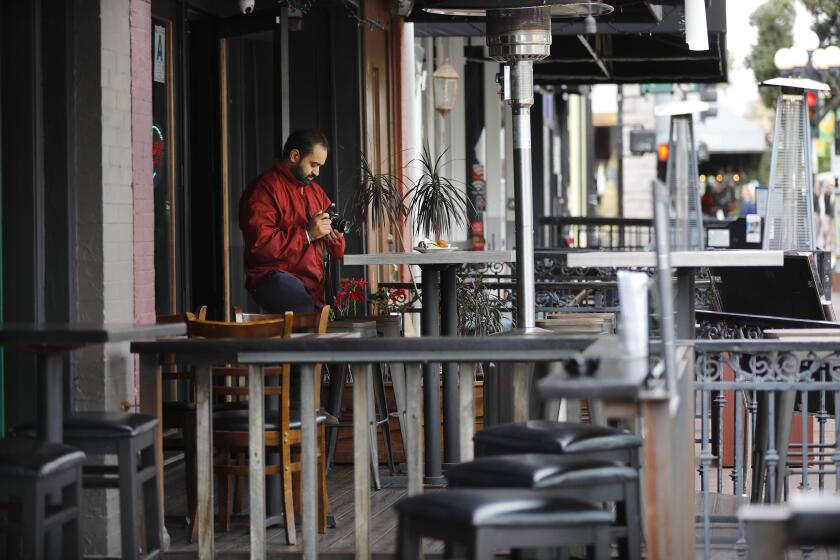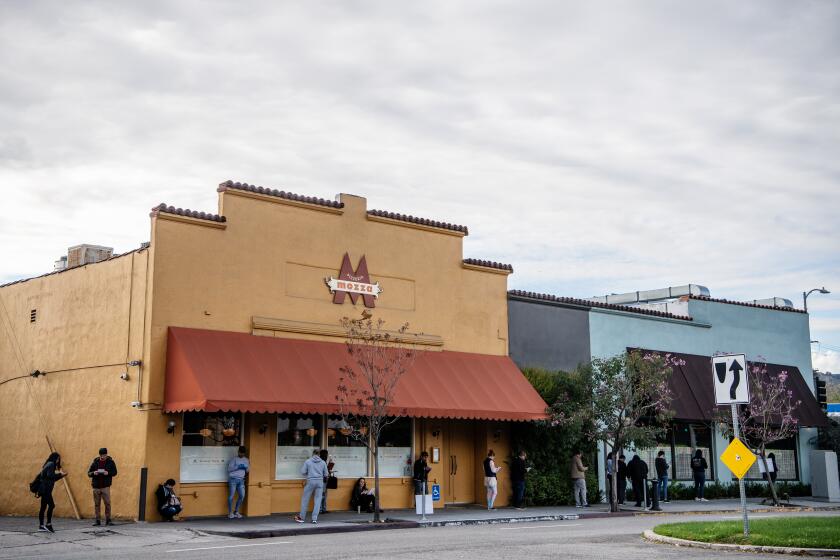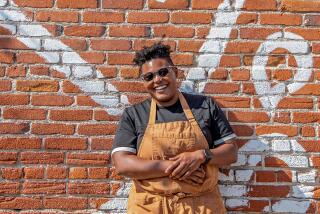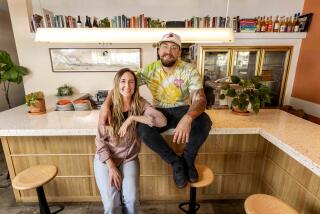‘There’s a lot of fear’: The coronavirus could fundamentally alter New York City’s restaurants
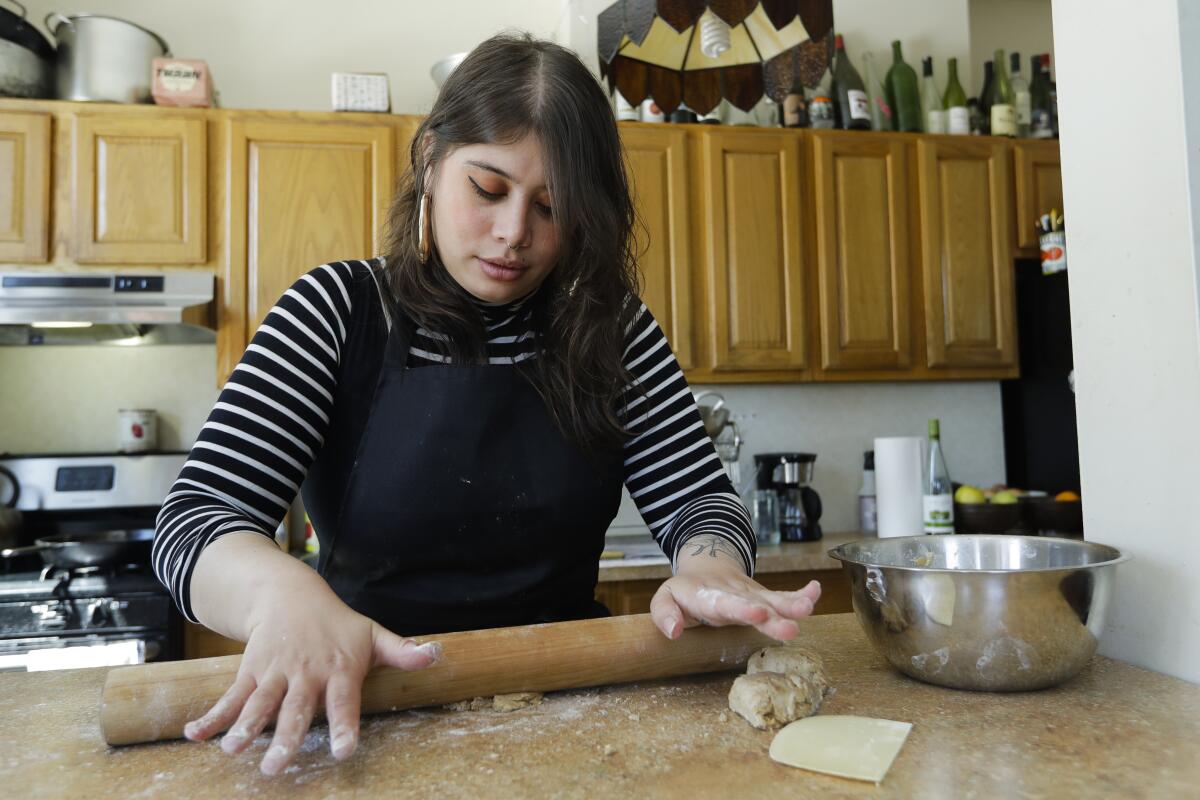
- Share via
For years, working in restaurants has been a constant for Isabella Gutierrez.
It was something she could always fall back on to pay the bills while she pursued her creative dreams. It was the first job she had when she moved to New York City in 2011 from California.
But no more. The coronavirus outbreak and the likely impact it’s going to have on New York City’s restaurants — how they serve, how they staff, how they pay — has disrupted all of that.
“This could fundamentally change restaurant culture,” said Gutierrez, 33.
Even when the restrictions are lifted and businesses start opening up, “I, for one, don’t see myself returning to restaurant work after this,” she said. “There’s going to be less money in it.”
Restaurants have been blindsided by the coronavirus pandemic. Here is a guide to services available to those affected, including financial and legal aid.
It’s a concern for restaurant owners in New York City, where sitting cheek by jowl in a crowded hot spot or in that tiny hole-in-the-wall hidden gem has been a way of life — one that doesn’t work in a socially distancing world.
“There’s a lot of fear,” said Melissa Fleischut, president of the New York State Restaurant Association. “Will tourists come back, will people come out? Are the employees going to want to come back to work? How are we going to convince everybody it’s safe and healthy to eat in a restaurant again?”
She said the social-distancing restrictions have been devastating — of the 660,000 people employed in restaurants in New York state in February, many of whom are in New York City, the organization’s estimates say 527,000 have been furloughed.
For Gutierrez, the end came abruptly. On March 15, she had been scheduled to go in for a dinner shift at the Brooklyn restaurant where she was a server when she got a call from her manager telling her the place was shutting down and “everyone was out of a job.”
Since then, thanks to the base unemployment amount plus an additional amount from one of the federal government’s pieces of stimulus legislation, she’s been getting about what she would make in a decent week as a server.
A list of organizations helping restaurant workers who have lost their jobs or had their wages reduced because of COVID-19
Gutierrez, who was sidelined by COVID-type symptoms in late March, also has applied for food stamps, spoken to her landlord and credit card company, and deferred her student loans.
“For me, the most overwhelming thing is I don’t know when I’ll get a job again,” Gutierrez said. “The concept of not being able to get a job, of not knowing when I’m going to get a job if that’s even possible because of the pandemic, is very frightening.”
She’s trying to think of it as an opportunity, putting her yoga teaching certification to use by conducting online sessions, working on her podcast and writing. After all, that’s why she had gone back to waitressing after four years away, to give her the flexibility to do more with her creative dreams.
“In one regard I’m excited about pursuing my creative endeavors harder, because that’s now my only option,” she said.
There is no other option for Gabby Namm, 27, who had been working as a cook at her Brooklyn restaurant for about a month and a half when it shut down in March.
The Queens resident has been cooking professionally for about eight years, and has always loved it.
“Food makes people really happy,” she said. “I really enjoy just seeing the results kind of immediately. There’s something so satisfying about being able to know ... you nourished people in some way.”
Namm also saw it as a solid bet for employment, doing what her dad, a former newspaper printer, advised her — picking a job that a computer couldn’t take over.
“Restaurants always need cooks. It was always reliable, until recently,” she said.
Her restaurant also shut down in the face of the pandemic, forcing her to file for unemployment, along with her fiancé, who is also a chef.
Namm applied for unemployment in mid-March, spending hours on the phone, but still hasn’t started getting money, forcing her to tap into savings to stay afloat.
“I think I’m OK for now. If my unemployment doesn’t come in soon, I’m definitely going to have a talk with my landlord,” she said.
She’s apprehensive about what the future holds for New York City’s restaurants, worried about finding another place to cook in a world where there are limits to how close people can be to one another.
“If I want to go back to my job, will they be able to afford to have me back, will they be allowed to have the staff that they want?” Namm said. “It’s definitely a whole other level of anxiety that has been brought on.”
She’s thought about whether there was something else she could do, but “this is what I do best. This is what I fell in love with doing and brings me joy everyday.”
Fleischut, the state restaurant association president, was optimistic that New York City would continue to have some form of the vibrant restaurant culture it’s renowned for.
“I don’t think it’s that hopeless,” she said, adding that restaurant owners “feel there won’t be a large presence of restaurants, it’s just, what does it look like? Can the small mom-and-pop dine-in restaurants survive? That’s the real question.”
More to Read
Eat your way across L.A.
Get our weekly Tasting Notes newsletter for reviews, news and more.
You may occasionally receive promotional content from the Los Angeles Times.
